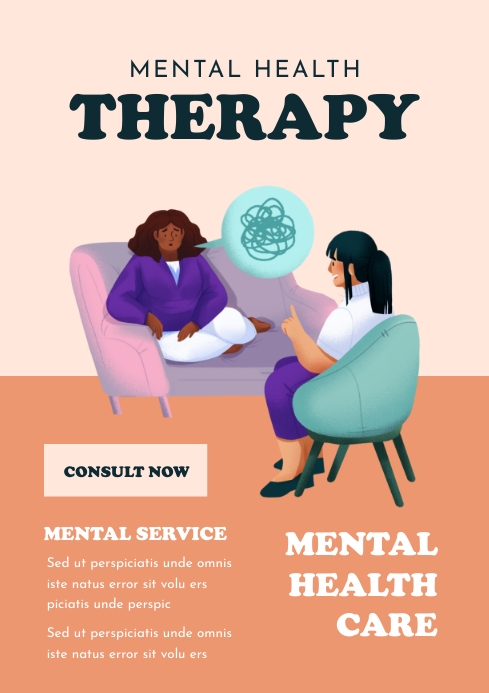Mental Health Resources That Won’t Break the Bank: Budget-Friendly Help
Wiki Article
Opening the Keys of Mental Health And Wellness: An Overview of Counseling and Treatment Options
Psychological wellness is a complex and important facet of total well-being. Various counseling and therapy options exist to resolve numerous psychological challenges. Each technique uses one-of-a-kind benefits and techniques customized to individual requirements. Understanding these options is essential for any individual looking for to enhance their mental health. Couples Therapy. What variables should one think about when exploring these opportunities? The response might disclose a path to a healthier moodComprehending Mental Wellness and Its Value
Mental health and wellness includes the emotional, psychological, and social wellness of individuals, substantially affecting just how they assume, feel, and act. Its relevance can not be overstated, as it influences every facet of life, consisting of connections, work performance, and overall top quality of life. People with great mental health have a tendency to cope with stress better, maintain much healthier connections, and make informed choices. Alternatively, poor mental health and wellness can lead to psychological distress, impaired performance, and different psychological conditions, which may require expert treatment. Understanding psychological health and wellness is crucial for identifying the indicators of distress and the requirement for assistance. Awareness likewise advertises empathy and lowers preconception, encouraging people to seek aid when necessary. By focusing on mental wellness, neighborhoods can cultivate environments that support psychological wellness, ultimately leading to healthier, much more resistant people. This foundation works as an important step towards efficient mental health and wellness counseling and therapy options.
Sorts Of Counseling Approaches
Therapy methods differ widely, each tailored to satisfy the distinct requirements of people looking for support. Among the most usual kinds are cognitive-behavioral treatment (CBT), which focuses on determining and changing negative thought patterns, and person-centered therapy, which stresses empathy and acceptance. Psychodynamic therapy checks out past experiences and subconscious processes to recognize existing behavior, while solution-focused short therapy intends to recognize remedies as opposed to examine problems.Additionally, family therapy addresses relational characteristics and interaction within households, cultivating much healthier communications. Team counseling provides a public area for participants to share experiences and support one another. Various other methods include existential therapy, which encourages people to find significance and purpose, and art or songs treatment, which makes use of imaginative expression as a therapeutic tool. Each technique uses distinctive methods and ideologies, enabling clients to discover the most suitable approach for their personal development and healing trips.Exploring Different Therapy Modalities
In the domain of mental health and wellness therapy, various therapy modalities provide distinct approaches to therapy. Cognitive Behavior modification emphasizes the link in between behaviors and ideas, while Psychodynamic Treatment discovers subconscious influences on emotional wellness. In Addition, Mindfulness-Based Methods advertise present-moment recognition as a means to boost psychological policy and total psychological health and wellness.Cognitive Behavioral Therapy
Cognitive Behavior Therapy (CBT) attracts attention as one of one of the most commonly practiced and looked into techniques in mental wellness therapy. This approach focuses on the affiliation between feelings, actions, and thoughts, stressing that modifying negative idea patterns can cause improved psychological well-being and behavior modifications. CBT is structured, typically including a minimal number of sessions, and aims to outfit individuals with useful skills to handle their signs and symptoms. It works for a variety of problems, including stress and anxiety disorders, anxiety, and trauma. By making use of strategies such as cognitive restructuring and direct exposure treatment, CBT cultivates resilience and encourages customers to face challenges head-on, making it a valuable choice in the landscape of mental wellness therapies.Psychodynamic Therapy Strategies
Psychodynamic treatment approaches provide a deep expedition of the subconscious mind and its impact on behavior and emotional well-being. Rooted in Freudian concept, these approaches stress the value of early childhood experiences and unconscious problems. With methods such as totally free association, desire evaluation, and transference, people obtain understanding into their ideas and sensations, cultivating self-awareness and understanding. This restorative modality urges customers to uncover repressed feelings and unsettled issues, which can be crucial in resolving present psychological obstacles. By taking a look at the interplay in between present behaviors and previous experiences, psychodynamic therapy aims to advertise psychological healing and individual growth. Inevitably, it supplies a framework for individuals to explore intricate inner characteristics that influence their psychological health and wellness.
Mindfulness-Based Strategies
While traditional therapies commonly concentrate on previous experiences, mindfulness-based strategies prioritize present-moment understanding as a path to psychological health. These strategies, including mindfulness-based cognitive treatment (MBCT) and mindfulness-based stress and anxiety decrease (MBSR), urge people to involve completely with their thoughts and feelings without judgment. Specialists learn to observe their psychological states, fostering a greater understanding of psychological triggers and feedbacks. This technique not just eases signs and symptoms of anxiousness and anxiety however likewise improves overall psychological durability. By integrating mindfulness exercises, such as reflection and deep breathing, customers cultivate a sense of tranquility and clearness. Eventually, mindfulness-based techniques empower people to browse life's difficulties with increased recognition and approval, promoting a healthier partnership with their emotions and thoughts.The Duty of a Specialist or Therapist
A competent specialist or counselor plays a vital function in sustaining people with their mental health and wellness journeys. They supply a risk-free, non-judgmental area where clients can reveal their sensations and thoughts openly. Marriage Counselling. By employing various healing strategies tailored to every individual's requirements, therapists assist customers check out underlying concerns that may add to their mental health and wellness challenges.Therapists offer support and tools to handle anxiety, anxiety, anxiety, and various other emotional troubles. Their training equips them to acknowledge patterns in behavior and believed procedures, assisting in insights that cause personal growth. They additionally promote a solid restorative partnership, which is important for effective outcomes.Moreover, therapists continue to be dedicated to discretion and ethical criteria, making certain a trusting setting. Eventually, the duty of a therapist or counselor is to empower people, urging them to establish durability and much healthier coping strategies while steering via life's intricaciesHow to Select the Right Therapy or Therapy Choice
Selecting the right counseling or treatment alternative begins with assessing private demands. It is vital to recognize personal challenges and objectives prior to discovering different therapy styles. This fundamental action can greatly influence the effectiveness of the chosen method.Evaluate Your Requirements

How can people successfully evaluate their mental wellness needs when evaluating therapy or treatment options? They need to reflect on their psychological state and identify certain issues, such as depression, anxiousness, or relationship challenges. Journaling can be a valuable tool for tracking ideas and sensations in time. Furthermore, people may profit from looking for comments from trusted friends or member of the family concerning perceived modifications in actions or Cognitive Behavioural Therapy state of mind. It is also valuable to examine individual objectives for treatment, such as boosting coping skills or gaining insight into personal patterns. Researching various counseling modalities and their suitability for specific needs can aid in making an informed option. Eventually, self-awareness plays a crucial role in selecting the right path for mental health support.
Discover Treatment Styles
While traversing the diverse landscape of treatment choices, individuals need to think about different styles of counseling to locate the very best suitable for their distinct needs. Cognitive Behavior Modification (CBT) focuses on changing adverse thought patterns, while Psychodynamic Therapy discovers previous experiences and subconscious processes. Humanistic approaches stress individual growth and self-actualization, promoting a supportive environment. In addition, mindfulness-based therapies cultivate present-moment understanding, helping emotional guideline. For those seeking structure, Solution-Focused Brief Therapy targets details goals and remedies. Team therapy gives a communal setup for common experiences and support. Inevitably, individuals should assess their preferences, convenience degrees, and particular obstacles, ensuring they choose a healing style that reverberates with their individual journey toward psychological well-being.Getting Over Barriers to Seeking Assistance

The Benefits of Counseling and Therapy for Psychological Wellness
Looking for assistance for psychological health obstacles can bring about considerable improvements in total wellness. Counseling and therapy provide individuals with a risk-free room to discover their sensations and ideas, fostering self-awareness and personal growth. These professional services outfit customers with coping techniques and analytical abilities customized to their special situations.Moreover, treatment can decrease signs and symptoms of anxiousness, depression, and other psychological health disorders, boosting psychological strength. Regular sessions promote liability and urge people to set and accomplish personal objectives. Via different therapeutic modalities, such as cognitive-behavioral therapy or mindfulness techniques, customers find out to reframe adverse ideas and establish healthier behaviors.Additionally, the therapeutic relationship itself can be a source of support, helping to battle seclusion and solitude. Generally, taking part in counseling and treatment is an aggressive action toward achieving psychological health, allowing individuals to lead even more satisfying lives.Often Asked Questions
For How Long Does Counseling or Therapy Generally Last?
The duration of therapy or therapy differs substantially, commonly lasting from a couple of sessions to several months or years. Factors affecting this include the person's certain needs, the sort of treatment, and therapeutic objectives.What Should I Expect During My Initial Session?
During the first session, people can expect an introduction, conversation of problems, and the specialist's technique. They may finish evaluations and establish goals, cultivating a secure atmosphere for open communication and structure connection.
Are There Any Risks Associated With Therapy?
Therapy can entail threats, such as emotional pain, vulnerability, or challenging uncomfortable memories. While these obstacles might emerge, they can likewise bring about personal growth and healing, making the restorative procedure complicated yet potentially gratifying.How Can I Tell if My Specialist Is an Excellent Fit?
Establishing if a specialist is a great fit involves assessing comfort, interaction design, and restorative method. Positive rapport and progression in the direction of objectives are signs of a suitable suit, necessary for effective mental wellness assistance.Will My Insurance Cover Therapy or Treatment Sessions?
Establishing insurance policy coverage for therapy or treatment sessions frequently requires speaking to the insurance coverage company directly. Plans vary substantially, so people ought to validate benefits, co-pays, and any necessary pre-approvals prior to going after therapy solutions. Among the most common kinds are cognitive-behavioral therapy (CBT), which concentrates on determining and changing adverse idea patterns, and person-centered therapy, which emphasizes compassion and acceptance. Psychodynamic therapy discovers previous experiences and subconscious processes to recognize present actions, while solution-focused short treatment aims to determine remedies rather than explore problems.Additionally, household treatment addresses relational dynamics and communication within households, fostering healthier communications. Various other techniques consist of existential therapy, which motivates people to find significance and objective, and art or songs therapy, which uses imaginative expression as a therapeutic tool. Cognitive Behavior Treatment stresses the connection between actions and thoughts, while Psychodynamic Therapy checks out subconscious impacts on emotional well-being. Cognitive Behavioral Treatment (CBT) focuses on changing unfavorable thought patterns, while Psychodynamic Treatment discovers subconscious processes and past experiences.Report this wiki page